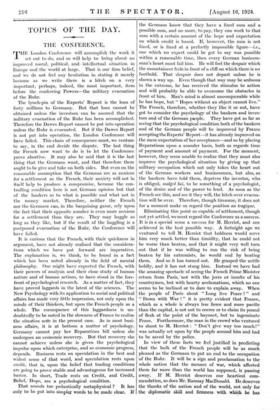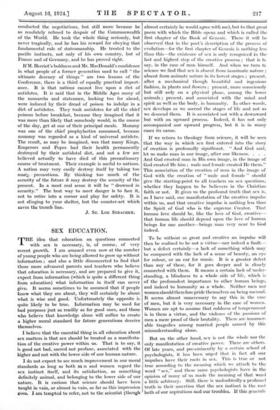TOPICS OF THE DAY.
THE CONFERENCE.
THE London Conference will accomplish the work it set out to do, and so will help to bring about an improved moral, political, and intellectual situation in Europe and the world at large. That is our firm belief, and we do not feel any hesitation in stating it merely because as we write there is a hitch on a very important, perhaps, indeed, the most important, item before the conferring Powers—the military evacuation of the Ruhr.
The lynch-pin of the Experts' Report is the loan of forty_ millions to Germany. But that loan cannot be obtained unless the investors can be assured that the military evacuation of the Ruhr has been accomplished. Therefore the Dawes Report cannot be put into operation unless the Ruhr is evacuated. But if the Dawes Report is not put into operation, the London Conference will have failed. This chain of consequence must, we venture to say, in the end decide the dispute. The last thing the French now want to do is to let the Conference prove abortive. It may also be said that it is the last thing that the Germans want, and that therefore there ought to be give and take on both sides. But even on the reasonable assumption that the Germans are as anxious for a settlement as the French, their anxiety will not in itself help to produce a compromise, because the con- trolling condition here is not German opinion but that of the bankers as to what is possible and what not in the money market. Therefore, neither the French nor the Germans can, in the bargaining game, rely upon the fact that their opposite number is even more anxious for a settlement than they are. They may haggle as long as they like, but if the result of the haggling is a postponed evacuation of the Ruhr, the Conference will have failed.
It is curious that the French, with their quickness in argument, have not already realized that the considera- tions which we have put forward are imperative. The explanation is, we think, to be found in a fact which has been noted already in the field of mental philosophy. One might have expected the French, with their powers of analysis and their close study of human nature and of human actions, to have stood in the fore- front of psychological research. As a matter of fact, they have proved laggards in the latest of the sciences. The New Psychology with its application to social and political affairs has made very little impression, not only upon the minds of their thinkers, but upon the French people as a whole. The consequence of this laggardness is un- doubtedly to be noted in the slowness of France to realize the situation nette in the present case. As in most busi- ness affairs, it is at bottom a matter of psychology. Germany cannot pay her Reparations bill unless she undergoes an economic recovery. But that recovery she cannot achieve unless she is given the psychological impulse upon which enterprise, and so economic progress, depends. Business rests on speculation in the best and widest sense of that word, and speculation rests upon credit, that is, upon the belief that trading conditions are going to prove stable and advantageous for increased barter. In short, Trade rests on Credit, and Credit, Belief, Hope, are a psychological condition.
That sounds too pedantically metaphysical ? It has only to be put into simpler words to be made clear. If the Germans know that they have a fixed sum and a possible sum, and no more, to pay, they can work to that sum with a certain amount of the hope and expectation on which credit is based. If, however, the sum is not fixed, or is fixed at a perfectly impossible figure—i.e., one which no expert could be got to say was possible within a reasonable time, then every German business- man's heart must fail him. He will feel the despair which the mountaineer feels in front of a cliff on which there is no foothold. That -despair does not depart unless he is shown a way up. Even though that way may be arduous in the extreme, he has received the stimulus to action and will probably be able to overcome the obstacles in front of him. Man's mind is almost unconquerable while he has hope, but "Hopes without an object cannot live." The French, therefore, whether they like it or not, have got to consider the psychology of the bankers and inves- tors and of the German people. They have got so far as seeing that the psychological condition both of the bankers and of the German people will be improved by France accepting the Experts' Report—it has already improved on the mere expectation of her acceptance—and so by placing Reparations upon a sounder basis, both as regards time of payment and amount of payment. For the moment, however, they seem unable to realize that they must also improve the psychological situation by giving up that military occupation which not only takes the heart out of the German workers and businessmen, but also, as the bankers have told them, deprives the investor, who is obliged, malgre lui, to be something of a psychologist, of the desire and of the power to lend. As soon as the French see this, and see it they will, the hitch over evacua- tion will be over. Therefore, though tiresome, it does not for a moment make us regard the position au tragique.
Eliminating this point as capable of settlement, though not yet settled, we must regard the Conference as a success. It is in a special sense a success for M. Herriot, and one achieved in the best possible way. A fortnight ago we ventured to tell M. Herriot that boldness would serve him very much better than timidity, that he could not be worse than beaten, and that it might very well turn out that if he was willing to run the risk of being beaten by his extremists, he would end by beating them. And so it has turned out. He grasped the nettle boldly, and it has not stung him. Instead we have had the amazing spectacle of seeing the French Prime Minister return from Paris, not with the jeers or insults of his countrymen, but with hearty acclamations, which no one seems to be inclined or to dare to explain away. When the people of Paris shout "Long live Peace I " and "Down with War ! " it is pretty evident that France, which as a whole is always less fierce and more pacific than the capital, is not out to coerce or to claim its pound of flesh at the point of the bayonet, but to ingeminate Peace. Furthermore, the man in the crowd who ventured to shout to M. Herriot : "Don't give way too much !" was actually set upon by the people around him and had to be saved by the police.
In view of these facts we feel justified in predicting that the bulk of the French people will be as much pleased as the Germans to put an end to the occupation of the Ruhr. It will be a sign and proclamation to the whole nation that the menace of war, which affected them far more than the world has supposed, is passing away. If M. Herriot deserves our heartiest com- mendation, so does Mr. Ramsay MacDonald. He deserves the thanks of the nation and of the world, not only for the diplomatic skill and firmness with which he has conducted the negotiations, but still more because he so resolutely refused to despair of the Commonwealth of the World. He took the whole thing seriously, but never tragically, and he has his reward for obeying that fundamental rule of statesmanship. He trusted to the pacific instincts, not only of his own country, but of France and of Germany, and he has proved right.
If M. Herriot's boldness and Mr. MacDonald's confidence in what people of a former generation used to call "the ultimate decency of things" are two lessons of the Conference, there is a third of equally practical import- ance. It is that nations cannot live upon a diet of antidotes. It is said that in the Middle Ages many of the monarchs and statesmen, looking too far ahead, were induced by their dread of poison to indulge in a diet of antidotes. They took antidotes for all the chief poisons before breakfast, because they imagined that it was more than likely that somebody would, in the course of the day, get at one of their principal meals. Mummy was one of the chief prophylactics consumed, because mummy was regarded as a kind of universal antidote. The result, as may be imagined, was that many Kings, Emperors and Popes had their health permanently destroyed by their antidotal diet, and not a few are believed actually to have died of this precautionary course of treatment. Their example is useful to nations. A nation may very easily destroy itself by taking too mai* precautions. By thinking too much of the security of the future it may destroy the security of the present. In a most real sense it will be "drowned in security." The best way to meet danger is to face it, not to retire into a corner and play for safety. It is not clinging to your shelter, but the counter-act which saves the trench line.
J. Si'. LOE STRACHEY.



































 Previous page
Previous page